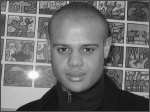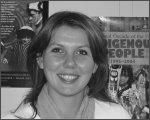Interviews with Youth Delegates to the 58th Session of the General Assembly - October 2003
In order to increase the influence of young people in decision-making processes, the United Nations has long been encouraging their member countries to send youth delegates as part of their delegations to the General Assembly (GA). The delegates are democratically selected delegates of the youth of their home countries. They take an active part in the discussions as well as giving a statement in the Third Committee of the General Assembly, which discusses social, humanitarian and cultural issues.
The youth delegates of 2003 included delegates from Australia, Denmark, Finland, the Netherlands, Norway and Sweden. You can read about their experiences below. You may also want to check out  the 2003 UNGA Youth delegates Information Kit, which the 2003 delegates prepared to advocate for continued youth representation at the GA.
the 2003 UNGA Youth delegates Information Kit, which the 2003 delegates prepared to advocate for continued youth representation at the GA.
 Adam Smith, Australia
Adam Smith, Australia
How did you get involved in youth issues?
When was I about 15 years old, I started volunteering with young people with disabilities. The surrounding community was more biased than I expected. This observation changed, challenged and motivated me to keep working with young people in other capacities as well. I worked with young people in emergency accommodation and in foster care, and became increasingly passionate about advocating for young people. I moved to NY and worked for the Coalition for the Homeless. These different experiences in different countries have continued to make me think that this is important work.
How did you become elected as a youth delegate?
The United Nations Youth Association is a very strong body in Australia. They advocate to our government and different organisations. Through them, I found out about the position of youth representative, and had several conversations them. After that I went through quite a lengthy application process. The appointment itself is in three phases: preparatory research and consultation, the work in New York, and the “real” work once I go back.
What do you think the UN can learn from Youth Participation?
It is necessary to develop notions of co-operation and global responsibility in young people now, or we might find ourselves in a point of crisis down the track. This is something young people can learn from the UN. What we can give back is a new way of looking at things and a lot of energy. Young people have a willingness to be active and participate in a positive way, whether that is on a local or global level.
What are you individually, and as a group of delegates, doing to increase youth participation at the UN?
First of all, we need to be aware that young people need to be represented but so do a lot of other groups. But going back to youth, we can demonstrate to Member States, the value in having conversation with young people, and hopefully they act on those conversations. We are very proud of the way the resolution has progressed and our input in that. We see this as a way of creating a mechanism for stronger youth participation in the UN. And when we go home, the present youth delegates hope to stay in touch with each other to keep the momentum going. We are able to take a lot of these messages and experiences home to lots of other groups.
What role do you think that youth organisations from developed countries can play in increasing UNGA youth participation from the lesser and least developed countries?
There is a big issue with representation. But, my value is youth participation and I think we should be aware that sending a delegate to the UN General Assembly is not always the best use of resources. Personally I value action at a national or a local level over that of the GA. Both are very important but if you had to choose one over the other, I would put the time and resources into developing local and national models of best practice and in communicating that to other nations. I think that is an area that we need to put more emphasis on.
You spoke of communication between developed and developing nations. Are you aware of Australian youth organisations that communicate with developing nations about best practice models?
I am not aware of a lot of international conversations on how to best engage with young people. Before I came here I spoke to about 10.000 different people from all ages and what was apparent to me is that everybody wants the best for young people. There is an enormous spirit of good will, but people really don’t always know how to improve outcomes for young people. So I think the challenge is that, even as a motivated developed country, we still need to be more courageous in seeking ways to work with young people. And once we start to have strong outcomes, we have the responsibility to share this.
What more do you think the UN should do for youth participation?
A good model would be if the UN supports the delegates to the GA in the three phases I spoke of before. But keeping the main focus on what happens when the delegates go back and following up on local action resulting from UN resolutions. The best thing is for the UN to maintain conversations with their member states about what countries do for their young people, and help member states to create mechanisms in order to progress their work with young people.
What work do you anticipate when you go back?
The Australian government supports some of this appointment but I had to raise a lot of other funds. In doing that, I have set up partnership with a lot of our national youth organisations. They sponsored me but they’ve also made a commitment to sponsor projects once I go home. So this way a lot of ideas that we are discussing at the United Nations can be implemented at the local level. Also, in working with these organisations we have an opportunity to incorporate global awareness into Australian youth’s local perspectives.
 Lars Dyrhagen, Denmark
Lars Dyrhagen, Denmark
How did you get involved in youth affairs?
I was a top athlete many years ago. I was a trainer as well as a swimmer. When I turned 18, I became involved in a political youth organisation. I became a Secretary General in a youth organisation in Denmark. My interest and involvement with youth has grown from these experiences—from a practical to a more institutional level of involvement.
How were you selected as a youth delegate in Denmark?
I was nominated by my organisation to the Danish Youth Council. After a selection process, I was selected by the Danish Youth Council. Then I was formally nominated to the foreign ministers and was appointed by the minister of foreign affairs of Denmark.
Can you explain the role of each of the two Danish youth delegates?
There are two Danish parliamentarian delegations at the GA for two different periods of time. Both delegations have a youth representative. Camilla Blomquist was the first youth delegate and I am here with the second delegation.
What is your role as a youth delegate?
I am here as an ambassador for youth, in the sense that I work to create a more youth friendly world. I am also a partner in the Danish delegation in order to maintain a focus on youth issues. I also want to gain enough experience in the UN so that I can be a person of resources when I come home. And I would like to increase awareness of UN youth involvement and start public debates amongst young people in Denmark.
What do you think the UN can learn from youth delegates?
Without youth participation there is no complete democratic process.
How do you think youth participation can be most effective?
If the participation rate would increase, it would be more effective. Also when youth delegates within the delegation are endowed with the same rights and obligations as the other delegates, which is the case, effectiveness is reinforced. Also, the youth delegate presents at the 3rd committee, which raises youth awareness.
What role do you think developing nations can play in increasing UNGA youth participation of developing countries?
Youth organisations’ internal structures can serve as a learning tool for youth, in the sense of democratic participation and leadership roles. Also, youth organisations can provide active youth willing to engage in practical ways. All these skills are beneficial to all societies. Therefore the promotion of youth participation provides a model that can benefit local societies.
What do you take home from your experience as a youth delegate?
I am not even halfway my stay here but so far I am interested in the millennium goals and how those create a common global development debate. I would also like to raise awareness about the UN’s involvement in social development.
 Salla Rundgren, Finland
Salla Rundgren, Finland
How did you get involved in youth affairs?
I joined a political youth movement five years ago and became very active. Since, I have been active in youth organisations on the national, regional and European level. I have always been passionate about youth participation, and I want to serve as an example.
How were you selected to be a youth delegate?
In Finland the procedure varies a little from year to year. The Ministry of Foreign Affairs allocates the task of electing a youth delegate to the national youth counsel, who in turn organises an election. The position is open to everyone, but usually it is helpful if you have the support of an organisation that can propose you as their candidate. A candidate has to explain how they can contribute to the UN, and what they can bring back from the UN to Finland.
Can you elaborate on how you see your contribution to the UN?
The main issue for youth delegates in the UN is to show that it is worthwhile to have a youth delegate. Including a youth representative in the delegation raises the country’s profile. Youth participation, in the negotiation and formulation of the UN youth resolution, strengthens the resolutions’ legitimacy. For example, I have been able to work very closely with my mission and because of that support, I have been able to contribute to the formulation of the resolution. But also just to be a young, new face within the UN promotes the idea of including youth delegates.
What are your thoughts on how developed nations can urge and support lesser-developed nations to include a youth representative in their delegation?
This is really one of our top priorities to find ways and mechanisms to address this. I always have phone numbers in my head like 8515, of which the fifteen represents the percentage of youth living in developed countries. The problem that many countries face is that youth delegates are elected through national youth counsels, and not by the government. Even though this is the right thing to do, many countries don’t have the structure. What if you don’t have a National Youth Counsel or a civil society that is structured to facilitate that. So even if the government would want a youth delegate, how would they find an appropriate one, without just taking an official’s daughter or son. If the youth movement is not organised then it is not a good partner to negotiate with either. What do we do? We go to different delegations and inform them. We also distribute  the 2003 UNGA Youth delegates Information Kit.
the 2003 UNGA Youth delegates Information Kit.
Do you think you can achieve more on an international level than a national level?
I think it all starts at the local level. The national platform is probably the most effective one for a young person. All though, it depends a little on the issue. The international level is obviously very important, but the decision making still occurs at the national level. If I had to chose the most effective venue I would chose the national one. Also because it is closer to people.
What has been a successful strategy to make youth participation more effective?
Initially, as a youth representative, you have to show that you are a reliable and stable partner who can contribute. It is most effective when you offer knowledge and experience. Show that you can contribute and do not just demand.
What more do you think the UN should do for youth participation?
There are already a lot of programs. When youth meetings are organised or when youths are consulted, those meetings should have an impact on the resolutions or action plans that follow. The UN can see to it that the suggestions are being incorporated in the actions plans that follow, or at least that the results of those meetings are presented to the right bodies.
What you anticipate bringing back to Finland?
First I will report to the ministries and youth counsels of Finland. And we are organising a UN day, where we discuss how the UN youth resolution will change Finnish youth policy. If the resolution passes as it is now then we will have a possible youth consultative meeting before the GA in 2005. We will have to consider how we will approach our goals in line with that consultative meeting. I will also devote some time to increase a broader awareness of UN’s social development involvement, by visiting schools, talking to the media and other profile raising events.
 Anna Chojnacka, The Netherlands
Anna Chojnacka, The Netherlands
How did you get involved with youth issues?
First of all, I think there is not really such a thing as youth issues. Young people are concerned with problems that affect the whole population. If you want to be active in any area, for example with environmental issues or politically, you automatically get involved in a youth organisation because of our age. Also, when you want to meet people from different countries it is easiest to meet them through youth organisations. So that is how I started, I first participated in different youth exchange programs, and other projects that were aimed at youth. After that, I started with organising events such as Model European Parliament and youth exchanges for people within and outside the European Union. I became interested in developing countries and work for an organisation that promotes Internet use in Africa, with the focus on young people.
How were you selected as a youth delegate?
The Dutch National Youth Council advertises the position in all the newspapers and everyone between the ages of 18 and 27 years is free to respond. The application process consists of writing several essays, a speech that you would like to deliver at the United Nations, and different interviews with the board of the youth council. They are the ones who select the youth representative that will join that year’s delegation to the UN. The Ministry of Foreign Affairs takes care of the arrangements and the costs of our stay here.
What is your role as a youth delegate?
The things I have done here have exceeded my expectations. I expected to be much more of an observer. But this year’s youth delegates were a good working team and we were able to extend our ideas. We were especially active in the part of the youth resolution that has a direct effect on the practical mandates, like having a consultative meeting in 2005 in regards to the World Programme of Action for Youth to the Year 2000 and Beyond. We also developed the idea of an evaluation tool kit, which is intended to be spread to different organisations world wide. The kit will provide an opportunity for young people to state their own views and perspectives on different priority areas of the World Programme of Action for Youth. For example, on issues like unemployment, or having to deal with AIDS/HIV on a daily basis etc. This way, issues effecting youth will be taken out the anonymous realm of statistics and will be given the face of the youth affected by these issues. I also think that you can’t evaluate youth issues unless you ask youth themselves what they think and experience. True youth participation is if youth can be involved in every part of the process: decision making, implementation, and the evaluation.
What can the UN learn from youth involvement?
Improving the world is a continuous process. There are people who have a lot of expertise but may not have the energy or mentality to do a lot of things. Young people are in general eager and energetic but they may not have the knowledge. Working together may be very good. Also we all live together in this world so we have to work together. And young people may have very different attitudes about certain issues than older people.
How do you think youth participation, on either the national or international level, can be most effective?
Within the UN there is a lot of opportunity to be active and be heard. In environments where the zeitgeist is more traditional it is more difficult and you may be bound to different rules. But still, if you participate you are more likely to be heard.
What role do you think youth organisations of developed nations can play in increasing UNGA youth participation from lesser and least developed countries?
There are a lot of cross-regional partnerships between different organisations. But it is a long road because often there is such a lack of resources in developing nations. Also, involved youth in developing nations often face illnesses and other issues that affect long term planning and relationships that are needed for effective partnerships. But even though it is a long road it is not impossible.
What will you take home from your experience of being a youth delegate?
I believe that one person can make a difference—although not by themselves. For example, I was really amazed by the enthusiasm and the willingness of people to cooperate on the evaluation kit. It really gives me hope because we achieved a lot. And once you feel that, you get energy and spirit and are motivated to do more. I will put all my effort into letting young people at home know that the UN is a very useful organisation. We never talk about all the labour that is done in the UN. People work very hard on issues and then work very hard on phrasing and framing issues that are really close to people’s heart. People on every level work very hard on seemingly small issues but they progress slowly and they keep communication open. As long as people talk, they don’t fight—that is really important.
What else will you do when you return to The Netherlands?
I have to visit several youth organisations. I will work with the United Nations Organisation in The Netherlands. We will work on a curriculum for a school course to teach about the United Nations. We are also planning a big media campaign about awareness of youth representation at the UN. I will also write a report for future youth delegates.
 Gry Larsen, Norway
Gry Larsen, Norway
How did you get involved in youth issues?
I have always been committed to community work and Norwegian organisations. I became really involved when I was sixteen after I came back from a year spend in Namibia, Africa. I decided I wanted to do something concrete to help make the world a better place to live in. I became an active member in a political youth organisation in Norway and from then on I worked on youth issues.
How were you selected as a youth delegate in Norway?
In Norway we select two youth delegates from the Norwegian Youth Council, one of the delegates is from a political youth organisation while the other one is from a NGO. I was elected because it was my political youth organisation’s turn. Every year we rotate amongst the political youth organisations.
What is your role as a youth delegate?
First of all to advocate for youth issues both within my delegation but also in the United Nations. I have also worked on issues of interest to Norway and Norwegian political youth organisations, such as young people in conflict areas and the Palestine question. Also, when you are elected as a youth representative, one of the commitments is that you are a part of the international board of the Norwegian Youth Council. So, my role is to gain knowledge about the UN system and to bring that knowledge back to my organisation and the Norwegian Youth Council.
What do you think the UN can learn from youth involvement?
There are many discussions within the UN system of the UN becoming more democratic. Most participants in that discussion speak about how the Security Council can be more democratic, and they speak of structural changes. I believe youth representation adds to the democratising process. The delegates at the GA are actually a fairly homogeneous group—mostly men between the ages of fifty and sixty. But, we are also part of society today and we should therefore be represented.
Do you have any thoughts on what developed nations can do to increase youth participation at the GA from developing nations?
Youth participation is much broader than participation at the GA. Participation is found in every part of society, for example participation in the family, at school, politically, in NGOs and so on. Youth of today wants to be heard. Therefore the task of promoting youth participation is to try to show that you can make better decisions on all levels of society when you involve youth. Our goal is to encourage all countries to do that. However, I think just because there are youth delegates from developed nations at the GA, doesn’t mean that there is less youth participation in developing nations. In Norway, we are not represented as we should be and neither are youth in most developing countries.
Do you think you can achieve more on a national or an international level?
Both because I think it is important to participate on every level.
What will you take home from your experience as a youth delegate?
I have learned so much in the past two weeks--to see how the system works and meeting the other youth delegates. We have all very different backgrounds and I have learned a lot from them as well. We have worked together a lot, on the youth resolution and the newsletter. Also I really believe in the UN system and that the UN plays a very important part in the world. Everything moves slow but in the right direction. It is quite something to see all these countries with different religions, cultures and traditions sit around the same table to discuss important issues. When I go back to Norway I want to travel around and tell people about this very special experience.
What else will you do when you return to Norway?
I will work with the Norwegian Youth Council and continue to take part in the international group. I will probably get invitations to talk about my experience and the UN system. I will follow up with the youth delegates for next year so that we can have some continuity in the work that we are doing here.
 Jonas Klang, Sweden
Jonas Klang, Sweden
How did you get involved with youth issues?
I began to work with student counsels when I was in high school. First I worked in my local school. Then I became part of the creation process of a national student counsel. I realised that the same ideas I had concerning students in school were present in the formulation of youth policies on the national level, for example, youth’s inclusion in the decision making process. Parallel to national involvement, I was also involved with national youth counsels that were involved with the United Nations. I have been a youth delegate twice for the UNESCO General conference, in 1997 and 2001. I am very interested in youth participation and people seem to agree that youth should be involved. But when it comes to the question of how, people run in different directions.
How were you selected as a youth representative?
I was elected through the National Youth Council of Sweden, LSU. There was a selection process in which member organisations could nominate candidates. I was nominated by my base-organisation, Peace Quest. One person of LSU’s board, and the person responsible for UN-issues interviewed the candidates. They made a recommendation to the board, who then elected.
Have you thought of models that would encourage an increase in youth participation?
I want to connect it to the youth delegates in the delegations. Within the delegation, I am on the same level of the parliamentarians. I have the same rights and conditions as they do. I have also the opportunity to meet a lot of people within the UN system and from the member states. For example, it is great to meet the ambassador of Suriname and say that it is great that there is a youth representative from his country. And that this person was elected by the youth council in his country. But of course, in the end it is dependent on each country’s government whether to include a youth representative in their delegation.
How do you think that youth participation can be most effective?
It is very important to be able to meet people and the UN provides this network. In a way the informal process, what happens outside the GA meetings, is much more important than what happens at the meetings. These meetings allow youth “to impress” people they meet, and show that people under 25 or 30 have valuable ideas. I also have a strong belief in the two pillars of youth participation at the UN, which are the youth delegates and the youth NGOs. The youth delegates are elected by youth councils, or at least big and democratic youth organisations in their country. The NGOs have a different perspective. Their knowledge is much more specific. They work on certain issues and are knowledgeable in those issues. Both institutions are important because one brings knowledge and expertise and the other brings democratic legitimacy and negotiating power.
What more do you think the UN should do for youth participation?
Included in the youth resolution is a request of the Secretary General to arrange a youth meeting. This helps to raise awareness and visibility of youths. I belief that the strong point of youth is not necessarily the norm setting part, but more the action that comes with reaching the goals. The meeting should present concrete goals, which can then reflect youth’ achievements concerning those goals. It is a way to show youth activity when it comes to achieving goals. This will also demystify what would happen when youth actually participates.
What will you do when you return to your country?
My most important mission is to path the way for next year’s youth delegates. To see whether the Swedish foreign ministry actually wants to send a youth representative next year. And if so, to see to it that the youth representative will have the money, support and contacts to actually go. It is also important to hand my experience over to next year’s delegate so they don’t have to start from scratch. I will also try to increase awareness that youth can be delegates.
 Welcome to the United Nations
Welcome to the United Nations

